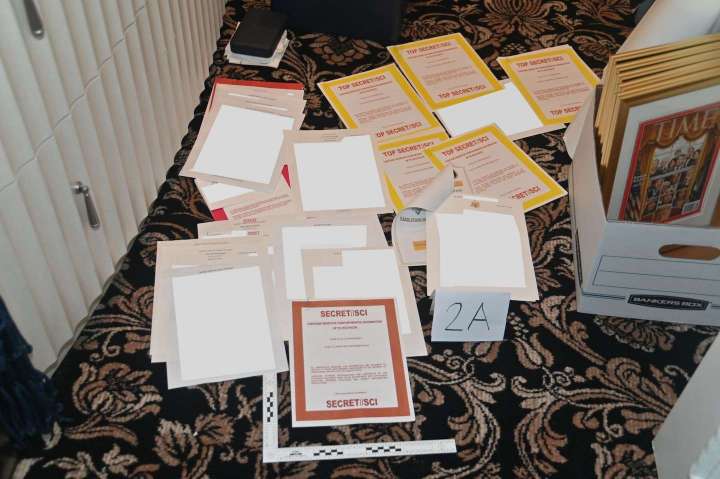One week ago, we learned an intriguing detail about the search of Donald Trump’s residence at Mar-a-Lago: Along with the roughly 100 classified documents recovered, the government also found 48 folders with banners marked “classified” but which were nonetheless empty.
Justice Department leans in on Trump and the empty folders

On Thursday, though, the Justice Department served notice that the empty folders are of significant interest. And it argued that tracing them to specific classified documents is among the urgent reasons that its review should be allowed to continue.
The Justice Department’s filing urges Judge Aileen M. Cannon to stay part of her ruling this week halting the Justice Department’s review of documents while a special master is allowed to examine them. The government narrowly requests that it be allowed to keep examining only the classified documents, not the many others recovered. It argues that the Justice Department’s criminal probe and the intelligence community’s risk assessment — the latter of which Cannon allowed to have continued access to the documents — are “inextricably” linked.
Among the handful of reasons mentioned: the empty folders. And the Justice Department implies that it might indeed be able to use the folders to determine whether there are larger issues than Trump merely having possessed classified documents. Specifically, it cites the possibility that classified documents might have been “lost” or “compromised.”
“The FBI would be chiefly responsible for investigating what materials may have once been stored in these folders and whether they may have been lost or compromised — steps that, again, may require the use of grand jury subpoenas, search warrants, and other criminal investigative tools and could lead to evidence that would also be highly relevant to advancing the criminal investigation,” the DOJ’s filing states.
Later in the filing, the Justice Department again returns to the idea that classified documents might still be missing.
“In addition, the injunction against using classified records in the criminal investigation could impede efforts to identify the existence of any additional classified records that are not being properly stored — which itself presents the potential for ongoing risk to national security,” it says.
The idea that the government hasn’t recovered all classified documents is hardly far-fetched. Trump, after all, failed to return all the documents when they were subpoenaed months ago, even as his lawyer asserted that all requested documents had been returned, federal prosecutors said last month.
The disclosure of the empty folders last week, though, raised the possibility that the government might have an avenue to answering that question. It’s not clear what detail might have been on the folders or how they could be traced to specific documents, but experts have said it’s possible to make such connections, as we reported last week:
David Priess, a former CIA officer whose work there included delivering the President’s Daily Brief, said Friday that the presence of empty folders doesn’t mean documents are missing, but also that it’s possible we won’t know for sure. He said the folders could contain markings allowing them to be traced to specific documents (but that’s not certain), or that they could be connected using forensic techniques.
“We cannot rule out that those empty folders contained classified documents that were not discovered in the search and seizure,” he said. “We just don’t know. That’s much harder to determine.”
He also noted it was possible that the folders were separated from the documents when they were still in the White House, before they were taken to Mar-a-Lago.
The government, notably, recovered the empty folders in its search on Aug. 8, and Cannon’s order halting its review came Monday. That provided nearly a month to try to connect the folders to the classified documents that had been recovered — either in the search itself or among documents previously returned by Trump and his legal team.
The National Archives in its February referral to the Justice Department noted that some documents Trump returned in January were “unfoldered” — a fact it listed among things that were “of most significant concern.” A plausible explanation would seem to be that those documents might be connected to the empty folders.
What the new filing suggests is that it wasn’t so simple to connect them, and the government says its efforts on that front should thus be allowed to continue. It says the reasons for that aren’t only the criminal investigation, but also national security. And it says the FBI needs to continue its review because its role in the process is central to the intelligence community’s risk assessment.
Specifically, it says the possibility that such information could be “compromised” is a “core aspect” of the criminal investigation. And in a footnote, it says that any such compromised information being identified would allow the intelligence community “to consider this information to determine whether they need to treat certain sources and methods as compromised.”
Trump’s legal team has yet to say much of substance about the empty folders. But in an interview earlier this week, Trump lawyer Alina Habba indicated she didn’t have a ready explanation. She even made a quip about the idea that the documents are “invisible.”
“It could mean anything. I don’t know,” she said. “It could mean that they gave those documents to [the National Archives] and to the FBI prior, as we know, which they had done. It could mean there was nothing in them. It could mean they’re invisible — if you’re in their administration. I truly don’t know.”
Neither, apparently, does the government. It says it’s still trying to find out. And so now it’s challenging Judge Cannon on a ruling that it argues could hamstring a crucial aspect of its review — not just of potential crimes, but also national security.






